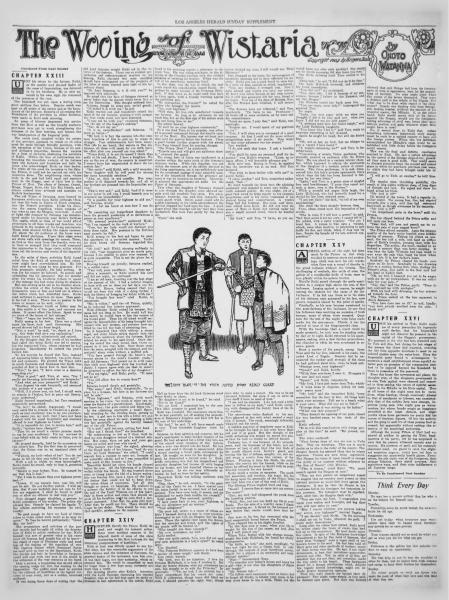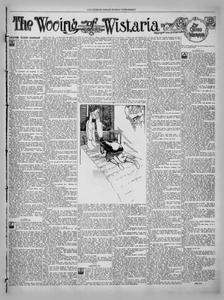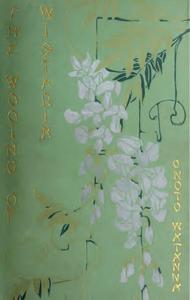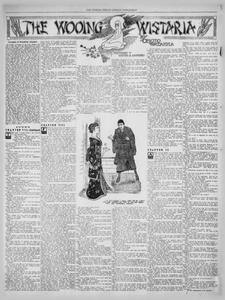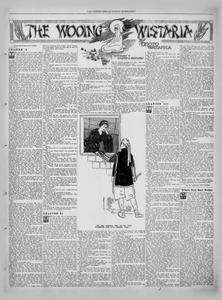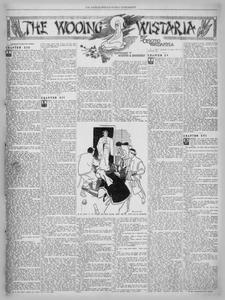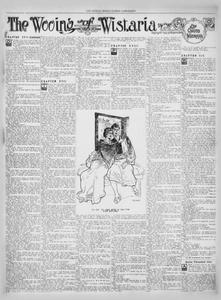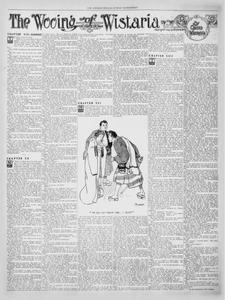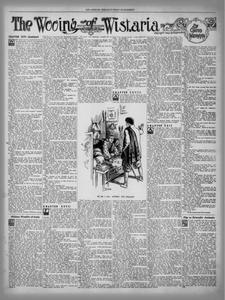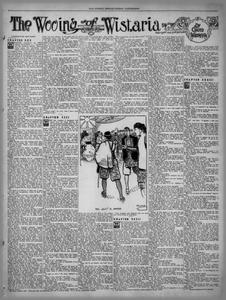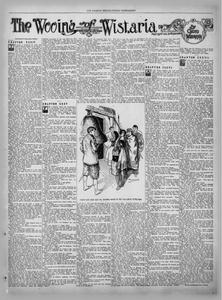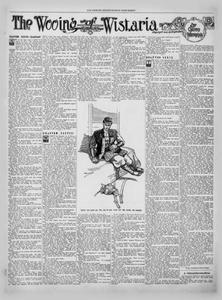Chapter XXIII
Upon his return to the fortress, Keiki, as the capable and devoted leader of the cause of Imperialism, was deferred to by his brothers. He at once assumed in his own right the command of the resources of the clan.
The household was put upon a footing even more military than before. Regular watch was kept at all points of the estate and at the boundaries of the province. Reports of all crossing the boundaries of the province in either direction were made to Keiki each morning.
An army of laborers impressed into service from the Mori as well as the friendly southern provinces were put to work strengthening the defenses of the Mori fortress, now become the war headquarters of the Imperial party.
The castle itself, situated within the centre of the province, approach to which on all sides must be made through friendly provinces, with the exception of the Catzu, because of its natural defensive properties, became the nucleus for a host of outworks sheltering the activities of Keiki. Within the line of fortifications surrounding the immediate vicinity of the fortress were the factories and foundries now built by those who acknowledged Keiki as their leader. For while all this owed its inception to the Shining Prince, it could not be carried out with his resources alone. The neighboring clans, whose lords in the past had held equal and superior rank to the Shogun, sent of their best to the Prince of Mori. The clans of Satsuma, Ozumi, Hinga, Nagate, Suwo, the Liu Kin Islands, and others ordered their artisans and mariners to Keiki’s headquarters.
The old Prince of Satsuma, more learned in European civilization than Keiki (although Choshui was the home in Japan of Dutch sciences), was the Prince’s preceptor. Under his direction the cannon foundries, whose weapons of war were to oust the Shogun, were built. A sort of light rifle designed by Satsuma was manufactured under his direction near Keiki’s fortress. The castle, which in time of war would afford protection to all these works and foundries, was reduced in the number of its living apartments. These were situated within the inmost recesses. All about the old portions of the house were built broad platforms. Upon their edges were set stone walls with openings for cannon. These, as fast as they came from the foundry, were set in tiers so arranged that they could command the approaches to the large circle, within which were set the factories and works of the Imperialists.
In the midst of these activities Keiki found relief from the flood of memories that otherwise might have overwhelmed him. He felt that now he was rising to true greatness. For him personally, selfishly, life held nothing. It was for his country he labored. So austere and unbending was his demeanor that for months after his return his brothers forbore to speak of the message that had come during his absence.
But one evening as he sat in his chamber alone, within the centre of the fortress, his brother Komozawa came to him and held out in silence the letter which had disturbed them. Keiki read sufficient to ascertain its tenor. Then gently he laid it aside. There was no passion to his tones or manner as he said, coldly:
“Brother, whatever truth or falsity may lie in this epistle is of the past, and concerns me alone. It cannot affect the future. Speak to me no more of the leaves of last autumn.”
“But—” began the brother, timidly.
Keiki sprang to his feet. There was a cloud upon his brown, dark and threatening. His sword showed half its bare length.
“Not a word,” he said, “or, dearly as I love you, this blade shall give you explanation.”
Komozawa bowed submissively and retired.
In the thoughts that the words of his brother had called into being Keiki was led to remember the imprisoned Toro, whose existence he had forgotten. Immediately he ordered the youth before him.
To his surprise he found that Toro, instead of appearing sullen or dejected, was quite cheerful and optimistic. He greeted the Prince with so much bonhomie and frankness that Keiki was puzzled at first to know how to treat him.
“Toro,” he said, “I have come to a decision regarding you.”
“That is good,” said Toro, at once, “for I really am becoming interested in my prospects.”
“And what are your prospects?” said Keiki.
Toro fingered his sash buoyantly, and assumed the attitude of a gay spark.
“Well, if it please you, my lord, I should wish to remain in Choshui, but at peace and liberty, pray understand.”
Keiki frowned impatiently, but Toro remained apparently unconcerned.
“In fact,” he added, ingenuously, “I would very much like to remain in Choshui as a guest—such as your excellency was in my own province. I do assure you, my lord, that I have not been treated with the equal hospitality and courtesy offered to your highness in Catzu.”
“It is impossible for you to remain here,” said Keiki; “matters have changed.”
“Then let me recall a certain promise made to me by your excellency. For my services in your behalf with my lady cousin in Catzu, you in return—”
He stopped abruptly, held by the expression on the other’s face. For the first time he perceived that the Prince was in an unnatural state of mind.
“Wistaria, my lord—what of her? You do not mean to tell me that you failed in your suit!”
With a sob in which no tears intermingled, Keiki raised his sword, only to drop it, groaning inwardly.
“Return to your father, Toro. Be warned by me that this is best.”
“But I wish to repeat that your highness promised—”
“Listen. If you remain here, your life will not be safe. Do not further protest. I will say this, that if your lordship does not care to follow my suggestion, I shall be forced to eject you or allow my officers to deal with you.”
Toro shrugged angry shoulders, a gesture to Keiki reminiscent of his mother. The action displeased him. Sharply he clapped his hands. To the officers answering his summons he said, briefly:
“Be good enough to have my Lord of Catzu taken to Catzu under such escort as he may require.” To Toro he bowed perfunctorily: “Good-day, my lord.”
The preparations and activities of the past few months had brought all within the domination of Keiki to active readiness for war. Keiki himself was now of greater value to his cause since old Satsuma had taught him all he knew—the result of years of European study and reading—of the making of the munitions of war. The lingering disease which threatened Satsuma need carry no fear to the Imperialists. Keiki, the disciple and heir in knowledge to Satsuma, could well cope with any man in the world in the utilization of the war resources at his hand.
Only a pretext, a happening that should afford the opening wedge for war, was wanting to the Imperialists. The public mind must be quieted by the outbreak of hostilities as the logical outcome of some event, not as a sudden, uncaused outburst.
It was during these days of waiting that the old Lord Satsuma sought Keiki out in the interior of the fortress. There was an evident perturbation and embarrassment manifest in his bearing. Keiki, alarmed lest some accident should have endangered one of the projects of the labor of years, started upon sight of his hereditary friend.
“My Lord Satsuma, is it ill with you?” he inquired with solicitude.
He noted that the face of Satsuma showed as never before that its master would never live to see the Restoration. This thought saddend him.
Satsuma, though in some pain, smiled gently.
“Ill indeed it is with me,” he said.
Keiki reached out and impulsively seized the hand of the old warrior, pressing it with sympathy that words could not have expressed.
“I may not be with you,” continued Satsuma, “on the day of the bakufu’s undoing.”
“Nay, do not say so.”
“It is so, nevertheless,” said Satsuma. “I must go before—”
“My lord, it is but the common lot—the common happiness of life to give up, to cease to struggle. Your achievements have been many. This rifle by my hand, that cannon in the embrasure, all these will speak for you with terrible effect after you yourself are long silent.”
“Prince Keiki, it is not for myself I think thus sadly of life and death. I have a daughter. We are on the eve of war, the country is unsettled. I cannot leave her unprotected to share its uncertain fate.”
“But surely,” said Keiki, with a mild surprise, “your daughter will be well cared for among her many honorable relations.”
“Alas, no, that is not possible. Her stepmother is ill disposed towards her, and all of her brothers are pressed into the Imperialist service.”
“This is very sad,” said Keiki, “and if it were in my power to aid you I would beseech you to command me immediately.”
“It is possible for your highness to aid me,” said Satsuma, slowly.
“How? Let me know at once how I can do so.”
“By permitting my insignificant daughter to have the personal protection of so chivalrous a prince as your excellency.”
“My personal protection!” exclaimed Keiki; “but I am engaged in the work of warfare.”
“True, but my lady would not distract you from these tasks. Her presence in the fortress need scarcely be felt.”
Keiki sprang to his feet and began to pace the apartment in a perturbed manner. Under his thick brows old Satsuma regarded him keenly.
“My lord,” said Keiki, stopping suddenly in his walk, “your suggestion gives me much pain, because I am unable to grant your request. It is quite impossible. This is not the place for a woman.”
Drawing himself up proudly, Satsuma replied, in a ruffled voice:
“Very well, your excellency. You refuse me.”
After a moment, as Keiki averted his face and did not reply, he continued:
“I am an old man, traveling over the last stage of the journey of life. I had a natural longing to have with me in these my last days my beloved child. Hence, feeling assured that you would not deny the wish of a dying father, I took the liberty of bringing her hither with me.”
“You brought her here!” cried Keiki, in amazement.
“She is within,” said the old Prince, quietly, as he indicated the interior apartment.
With difficulty Keiki curbed his temper. Satsuma had not long to live. He would tell him his secret; he would bare to him the source of his buried grief. Thus his old friend would recognize the impossibility of his being brought into contact with any woman, and perceive how unfitted he was for the task of protecting her.
So it happened that while without a storm raged, and rainy blasts struck sharply into the faces of the sentinels about the fortress, Keiki related his story to his aged friend. Once during the recital the shoji moved, then there appeared in it two tiny holes. Once there crept into the room, mingled with the tempest and the sentinels’ sharp cries without, a muffled sob.
“You have passed through the heart’s narrowest straits to the mind’s broadest realm,” said old Satsuma; “but permit me to still insist that while your highness’ story has touched me deeply, I cannot agree with you that it should be permitted to affect the fate of my daughter.”
“You are right,” said Keiki, gently. “It must not do so.”
“You will allow her to remain here?”
“Yes.”
Satsuma bowed deeply and gratefully.
“The camp,” said Keiki, thoughtfully, “is no place for a woman, but here in my fortress she will be safe.”
“Your highness,” said Satsuma, with much emotion in his voice, “no words of mine can express the thanks of a grateful heart. Good-night, my brave boy; the gods comfort and bless you.”
In the adjoining apartment a small figure, half crouching by the dividing doors, sprang to its feet. A girl ran to him with a little cry and threw her arms about his neck, pressing a little wet fact gratefully against the heavily limned one of the old Prince.
“It is well,” said Satsuma, patting her head.
“How can I thank thee?” she breathed.
“By endeavoring to feel as if thou wert indeed my own daughter instead of a distant relative. But come, thou art pale, and your garments are soiled and torn with travel.”
“The journey was long,” she sighed, glancing at the frayed ends of her kimono, “and do you know, my Lord Satsuma,” she added, “I could scarcely hire a runner to carry me, because of my unworldly attire, and so I was compelled to make much of the journey on foot.”
Meanwhile Keiki sat alone, his hands clasped before his eyes. All the bitterness of a lifetime welled within his bosom. He was trusted above men; at young years the idol of a brave nation; fate was bearing him upon a wave of the highest destiny that could not fail to beat down the rotten dikes of oppression. Yet all this brought no peace, no happiness. He realized in a moment the futility of all his efforts to put the soul of the Lady Wistaria out of his heart. Only in fierce action and strain that should engross all his faculties could he even find a temporary casement. After that, the gods pity him! After that, he could not live. There should no longer be any delay. There should be war, and that speedily, perhaps on the morrow.
Chapter XXIV
However fiercely the Prince Keiki desired and sought for instant action, there were excellent reasons in the delayed march of some of the clans journeying to the Mori fortress for the temporary postponement of hostilities.
Keiki at first was bitterly opposed to any further delay, but the reasonable arguments of the older daimios and the insistence of Satsuma, the practical leader of the movement, won him over. It was their logic, not their authority, which restrained him. He would be compelled to wait no longer than a few days more, certainly not more than a week.
One morning shortly after Keiki’s interview with the Lord Satsuma concerning his reputed daughter, who so far had kept apart in strict retirement in her apartments in the castle, Keiki found in his morning reports a reference to the youth Toro. He was riding post-haste in the direction of the Choshui province with the evident intention of crossing its frontier. What was the will of his excellency respecting him?
So this, then, was the way in which the rash youth repaid his consideration, mused Keiki. Or perhaps he came because of the Princess Hollyhock. If that were so, he would send him back to Catzu again, with a friendly warning against the perfidious sex.
“He approaches the frontier?” he asked the soldier who brought the reports.
“Yes, your highness.”
“Well then, let him ride unmolested towards our fortress. So long as he advances do not touch him, but at the first sign of his return seize him and bring him to me.”
The soldier bowed.
“It shall be as your highness commands.”
So it was that Toro, to his surprise, was allowed to proceed unharmed through the hostile country of the Mori. His journey was without incident until his arrival before the fortress. There a guard barred farther progress with his sword. Toro flung himself from his panting chrager.
“The Prince Mori?” he questioned.
“Expects you and will give you audience shortly,” returned the guard.
The young heir of Catzu was conducted to a chamber within the outer circle of the fortress’s defensive works. While this chamber was not within the inmost area of the edifice devoted to the living apartments, yet it was sufficiently near for the occasional passage of some peaceable member of the household through the grimmer servants of war to occasion no comment. Moreover, it adjoined the apartments set aside for the Prince of Satsuma.
Thus when the daughter of Satsuma chanced to pass through the chamber, none showed surprise until the youthful Toro came. His astonishment, however, was such that instantly his mouth gaped wide. Before sound could add its audible testimony to his visible astonishment, the girl had clapped her hand upon his lips. A quick glance about the chamber told her that they were unobserved. She took Toro gently by the shoulder.
“Come,” she said.
Half an hour later she old Lord Satsuma stood before Keiki in alarm.
“My daughter is not to be found,” he cried.
“Not to be found!”
“No, my lord. I committed her to thy care. Thou didst promise to guard her.”
Keiki was troubled. His conscience smote him, for he had painfully put off making the acquaintance of Satsuma’s daughter and had left her to the care of his underlings.
“My lord,” he said, “I will have search made at once. Your honorable daughter must be found.”
Satsuma, in deep agitation and concern, left his pupil’s apartment to make further inquiry of the guard. He had advanced but a little way into one of the armed outer chambers of the fortress when a note was slipped into his hand. He tore it open and read it through in amazement. After a second reading a broad smile overspread his face. He sought no more for his daughter. Instead, he dispatched a hurried note to Keiki, briefly informing him that his insignificant and unworthy daughter had become ill with longing for her home, and had departed thence on her own account. As she was very efficiently attended, he had no fears for her safety.
Meanwhile Keiki was holding audience with Catzu Toro.
“This, then,” he said, severely, “is the gratitude of the Catzu for me. I have spared your life, twice forfeit to me by every law of lord and samurai. You have come by, it seems, and are determined to make fresh trouble for yourself.”
Keiki paused. Toro answered, quickly:
“I have come back to you, your highness, to offer my allegiance and my service.”
“Your allegiance!”
“My poor aid, rather, to a cause of whose nobility I learned during my stay in your province. Sovereignty is not with the Shogun, but the Emperor. Place the rightful ruler upon the throne, oust the usurper and tyrant, and the rights of the people will be listened to.”
“Who taught these counsels?”
“My own conscience, my lord.”
Keiki smiled.
“Are you quite certain, Toro, you did not read your new principles in a lady’s eyes?” he asked dryly.
Toro blushed.
“The Princess Hollyhock appears to have been a teacher of some weight,” said Keiki.
Toro cried, warmly:
“My lord, you do me injustice. I love the Princess Hollyhock, it is true—I confess it. But what my honor dictates, what my conscience has seen, has naught to do with the Princess.” Ingenuously: “’Tis, my lord, I do protest, but a happy coincidence that her views are mine. Were it otherwise, though tears did blind my eyes, I should perceive the right way; though sorrow chocked my voice, I would still cry, ‘Daigi Meibunor!’”
Toro dropped to his knees, his extravagance of expression seeming not to have affected his sincerity. Keiki put out a quick hand to raise him. In a voice of deep emotion he cried, impulsively:
“Toro, my brother, I wronged you. Now I make amend and receive you into our service. My heart was bitter because of my own sorrow, but it still has generosity left for you, friend of my hopes. You are of the days of flowers. Now, after the flowers have withered, I still receive you.”
“The flowers have not withered,” said Toro, impulsively. “Do listen to me. Perchance—” He broke off in some confusion, as by some sudden remembrance.
“Speak no more, I pray thee,” said Keiki, commandingly.
“Forgive me. I would speak of my gratitude to you.”
“Toro, I will place you in command of a small company. At first I could not do more without antagonizing some of my people. They would say that your adherence was too recent.”
Toro replied:
“I do not seek that honor. I ask a humbler station.”
“You shall be upon my personal staff for the present,” was Keiki’s response. “Later, as occasion offers, I will honorably advance you.”
Keiki now rose. Bowing to Toro, he signified that the interview was at an end. Still Toro hesitated.
“You wish to have further talk with me?” inquired Keiki.
“I crave pardon,” said Toro, somewhat embarrassed, “but—”
He went towards the doors into the adjoining apartment and signaled to some one within. A youth entered quietly. He was slight, yet of a grace that owed to its being equally to his exquisite proportions and to his entire command of his physical being and comportment. A youth’s fringe hid his forehead. His eyes, cast down, were veiled from Keiki. He did not wear the armor of Toro or Keiki, but carried under his arm a small encased sword, which he handled easily.
“My lord,” said Toro, “I have, as you see, been able to make a recruit. He was to be my personal follower, but since I am to serve on your staff I have no need of him.”
“I am not an exquisite. I do not need a little man to follow at my heels,” said Keiki, surveying with disapproval the dainty lines of the little warrior.
The unwelcome visitor flushed to his ears. Toro glanced at him with what seemed a suspicion of humor. The youth, seemingly infuriated, whipped out his sword.
A sudden suspicion of treachery came to Keiki as he brought his hand to his own heavy blade and put it at guard. But the thought of the youth attacking him seemed to amuse him also, so that he took no trouble to defend himself.
Perhaps, too, it was because of his astonishment, and the heaviness of his blade, and not because of lack of skill, that the tiny blade of the youth slipped down Keiki’s guard, and, leaving the line of defense, sought, cut, and carried away a rosette from the cuirass of the Prince. Plucking it from his blade, the youth thrust the rosette into his breast, while on his knees he offered his sword to Keiki with its point directed towards his own breast.
Keiki made a motion of surprise. The youth had answered, and worthily, his taunt. But his life hung upon the generosity of the Prince. Toro saw that here was a test of the soul of Keiki.
The Shining Prince laughed loud and long.
“Good! I receive thee at once into my service. Thy name?”
“Jiro, my lord,” half whispered the youth from his kneeling position.
“Well, Jiro, just now you held my life in your hands. For the sake of a worthy cause I thank you for sparing me. A thrust in the loosened corsage below that rosette would have done for me.”
Jiro rose to his feet, but remained with his head respectfully bowed before the Prince.
Toro clapped him on his slight shoulder.
“In the days soon to come, when your life is sought by the foes of the cause, my lord, Jiro and I will protect you.”
When Toro, flushed with his strange success, sought the Lady Hollyhock, he found her wholly unresponsive.
“In faith, my lord,” she said mockingly, “it was not right for you, a Catzu lord, to ride through the outposts of your hereditary enemy, simply for a glimpse of an unworthy and insignificant maiden.”
“Nay—” remonstrated Toro.
“To abandon your father’s house and hopes for a girl—that is not what the daughters of Nipon are taught.”
“My dearest lady—”
“To follow one’s conscience were an honor, but to forget all blindly, to betray your cause, to betray your house to win a wife. Think you she would have you after such perfidy? She would not be worth possessing did she favor you then.”
One little, unfeeling hand Toro carried to his heart.
“Dear lady,” he said, “I did not do it for thee.”
The Lady Hollyhock frowned, and withdrew her hand immediately.
“You did not?” she exclaimed.
“Nay, dear lady. I did it because of my conscience, because I believe in the Emperor, and not the Shogun.”
The Princess turned her back upon him.
“You are angry, sweet lady?” interrogated the agitated Toro.
No reply.
“Lady, you were angry with me when you thought I did it for you, and now when you know I did not you are still angry.”
“A princess must have her brave knight,” said the Lady Hollyhock, haughtily.
“You know why I did it,” said Toro, ready to forswear everything at her demand.
Again he sought her hand, but still she denied him.
“Oh, not so fast, my lord. Let me whisper to you a report I have heard.”
“A report—concerning me?” said Toro, in bewilderment.
“Concerning a certain Catzu gentleman who recently awaited an audience with the Prince Mori. He was placed in a certain interior chamber, which happened to adjoin the apartments of the daughter of a certain prince of prominence. This Catzu gentleman, it is said, disappeared into this lady’s private apartments. Since which time the lady has been banished to Satsuma by her own father.”
“Lady,” said Toro, in a great state of mingled fear and bewilderment, “I pray thee repeat not such a story, even to the flowers.”
With a scornful and angry little laugh, the Lady Hollyhock, who had inwardly hoped for a denial by her lover, stepped away.
“I am not likely,” she said, “to tell of my own supplanting.”
She drew the doors sharply between them.
Toro, alone, mused upon the imputation of her words.
“She is mine if I tell her a secret,” he said, “but that secret is not my own; I cannot tell it!” He added, with a naïve wisdom: “Nor can I trust her. A woman is like unto a volcano, which, even when inactive, is palpitating to spit forth its fire, and which, when it does vent its fury, bursts the bounds of its late enforced suppression.”
Chapter XXV
A small portion of the night had been spent by the Prince in that sleep, troubled by nervous starts and awakenings, which was now his only repose, when there was a sound of disorder in the great inclosure without the fortress. The challenging of sentinels, the rattle of arms, the gallop of a considerable body of horse, came to him plainly within the palace interior.
Hastily Keiki passed through the castle apartments to a parapet high above the area of the inclosure. Leaning against a cannon, he sought among the shadows for the cause of the disturbance. If he had any fears as to the state of his defenses, none appeared in his face, now grown impassive almost to the point of apathy.
Gradually, as his eyes became accustomed to the semi-darkness of the inclosure, he saw that his followers were receiving an accession of fresh troops, many of whom were mounted. Quarters for the rest of the night were being made ready for the new-comers. Plainly, it was the arrival of some of the long-expected clans.
With the knowledge that a report would be made presently, for such was his standing order by day or by night, Keiki returned to his apartments, seeking, after a few further preparations, the chamber in which he was accustomed to receive guests.
Soon a number of his people, among them Toro and the boy Jiro, ushered in his cousin, the cadet Lord of Nagato. Scarcely had he announced the number and strength of the clans he had gathered about him, when he burst out:
“Strange new, your highness!”
“Speak,” said Keiki, briefly.
“With these eyes have I seen it. Ill augurs it for our land and cause.”
“Speak,” said Keiki, impatiently.
“My lord, I have just come from Yedo, whither I went alone in disguise, joining my men only yester morn.”
“My lord,” said the impatient Keiki, “pray remember that the hour is late. All things wait upon your utterance. Tell me in a breath what is your news. What did you see in Yedo?”
“Foreign ships of war sailing up the harbor.”
“What was their purpose?”
“They demand the opening of our ports, closed for two hundred years, to the trade of the world.”
Keiki reflected.
“It is evil—this complication with foreign peoples at this time,” he said. “But proceed, my lord.”
The other continued:
“Four foreign ships of war are now in Yedo Bay. They are American. They are in much doubt as to who is the ruler of the country. The Shogun Iyesada has assured them that he reigns supreme. Treaties are now being negotiated. The Shogun has taken it upon himself to change the policy of our country without reference to the Son of Heaven” (the Mikado).
“This is treason,” cried Keiki. “We must march against the Shogun at once.”
“Nay, my lord, permit an insignificant vassal to suggest that our country must present at this critical juncture an undivided front against the foreigner. It may be that the Shogun in his weakness before the foreigner but temporizes in his presence. The foreigner must be expelled, and, after that, the Shogun dealt with.”
“You are right, my lord. I congratulate you upon your wisdom and foresigh, and beg that you will now retire to rest.”
“May I inquire whether you purpose taking any action, your highness?” inquired Nagato.
“I am decided,” said Keiki. “In the morning I shall set out for Yedo, whatever the peril. I must make observations.”
Long after the others had retired, Keiki tried to review clearly the train of events that had led up to this occurrence. He must decide upon his course. In spite of the European knowledge transferred to him by the Lord of Satsuma, the very term “foreigner” sent a vague thrill of unknown terror to his soul. He had been told of their arms and other methods of warfare; many of their secrets were his. He had, if not their armaments, at least fair imitations—gunpowder, cannon and rifles. Yet, in spite of all this, an emotion that was not fear, not cowardice, made its way subtly to his heart. These foreigners stood for a strange civilization which, despite his vaguely derived knowledge, might yet include greater destructive agencies.
Then who could clearly see beyond their diplomacy? They might come simply, as they said, to demand open ports. But their own history showed that such things had been the forerunners of wars of aggression, wars for the acquisition of territory. No man might know what the extent of the latter demanded. They were a distinct peril to the whole of Dai Nippon. Yet what was to be done with regard to the shogunate? Iyesada was dealing with these foreigners, making treaties, without the sanction of his imperial master, the Mikado. If, on the other hand, Keiki should move with all his forces against the Shogun, would not the foreigners, taking advantage of civil war, better their mysterious position and gain whatever object they might have in view?
No, it seemed clear to Keiki that, unless something unforeseen intervened, every energy must be made by a united country to keep out the foreign powers. When this was definitely accomplished the Mikado’s reign would be established with little delay before the foreigners could recover.
This was the final and definite conclusion reached by Keiki. He saw a certain advantage in the arrival of the foreign ships-of-war, provided they came in good faith. They would serve to distract attention from the aroused and armed state in which the southern provinces now were, to which they had been brought under his direction.
“I will go to Yedo at sunrise,” he told himself.
His temples were throbbing painfully, the result of long nights without sleep, of long days of thought and care. He sighed and drew his hand across his brow.
“My lord is ill?”
He started at the voice. It had a vaguely familiar sound. The young boy, Jiro, had started towards him a pace, and then had retreated backward, as though overcome by his temerity.
“My lord is ill?”
“An insignificant pain in the brow,” said the Prince.
The boy slipped behind the Prince softly and fell upon one knee.
“Dear lord, will you not permit me to relieve the pain of your august brow?”
The Prince stirred uneasily. Again the strange quality of the boy’s voice touched some hidden spring of memory. Taking his silence as consent, the boy laid a soft, cool hand on either side of Keiki’s temples, pressing them with his finger-tips. The action, the touch, recalled in an instant a memory that was better sleeping. It was thus the Lady Wistaria had been wont to woo away the pain that beset his brow when he had lain ill in her father’s house.
Suddenly the Prince clasped his hands over those on his brow. Gradually he was drawing Jiro to a position facing him, when, eluding the Prince’s grasp, Jiro sank to the floor and laid his head at Keiki’s feet.
“Oh, my lord, I beseech you not to be angry with me for my forwardness. It was my solicitude for your pain—”
“Nay, rise,” said the Prince, gently. “Pray do not confound me with apologies.”
With his head still drooping, the boy retreated towards the door.
The Prince smiled at the fear apparent in Jiro’s demeanor.
“You have done me no ill,” he said, kindly: “you have actualy soothed away the pain. I thank you.”
Chapter XXVI
Upon his arrival in Yedo, Keiki made use of every precaution his ingenuity could devise, that the Imperialist might not discover his presence in the capital of the Shogun’s government. His approach to the city had been attended only by Toro and Jiro, but during the last stage of the journey the three had separated, entering the city from opposite directions to meet in the isolated quarter near the water-front. Here the Imperialist party found it advantageous to maintain a small establishment whose squalid exterior gave no promise of the comparative comfort to be enjoyed beyond the threshold by those in possession of the pass-word.
From this house the movements and plans, the thoughts even, of the shogunate government in its own Yedo capital were observed and reported to those seeking the return of rightful sovereignty to the Mikado in his Kioto capital. Here at all hours of the night men came in mean dress, whose bearing, though consciously abased to that of merchants or labourers, was unmistakably that of the noble; here came strange, imperious young men who might pose as water-carriers, but whose hands sought an imaginary swordbelt at the least obstacle, and slight youths whose loose garments too poorly hid the curves of feminine figures. Of late the activity and the going to and fro of these persons had increased, but apparently without exciting the attention of the municipal authorities.
Although the young Prince of Mori had employed all artifice in gaining the Yedo headquarters of his party, yet he was surprised to note that his person attracted scarcely any attention. His position of peril, and his naturally observant mind, on guard to catch the slightest suspicious augury, would have led him to exaggerate any apparently hostile glance. Everywhere, the sole topic was of the foreigners, their strange behaviour, their stated purposes, their mysterious ways, and their utter indifference to all Japanese usage.
To Be Continued Next Sunday
